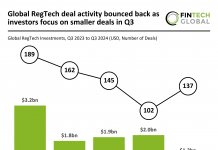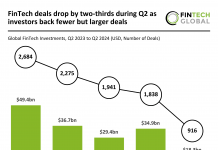If any FinTech company’s funding round can be said to have broken the internet, the stocktrading startup Robinhood’s Series F round should definitely be in the running.
Having originally closed the round at $280m in May this year, the FinTech unicorn has now expanded the round considerably.
“We’re pleased to share that we’ve raised an additional $320m in subsequent closings, bringing our total for the round to $600m,” Robinhood said in a statement. “The new funding comes from new and existing investors, including TSG Consumer Partners and IVP, and brings our post-money valuation to $8.6bn.”
That means that the company’s valuation also jumped from $8.3bn from its original Series F close in May.
The original round announced in May was led by existing investor Sequoia Capital. It also saw participation from existing and new investors including NEA, Ribbit Capital, 9Yards Capital and Unusual Ventures.
The $600m raised by Robinhood is one of the biggest rounds reported on in the FinTech industry, dwarfing even UK challenger bank Revolut’s $500m raise from February.
Techcrunch’s Alex Wilhelm noted that Robinhood’s new influx of fresh capital was unsurprising considering the company “is seeing demand for its product surge as investors of all sizes take part in the year’s huge equity volatility; many investing-and-savings-focused FinTech companies are enjoying a huge year, as consumers look to hoard, and employ their cash.”
Robinhood was founded in 2013 and has continued to grow since, boasting having over ten million customers by the end of 2019. In May, Robinhood had over three million funded accounts on its books.
Robinhood raised a $323m Series E round in July 2019 at a $7.6bn valuation.
That being said, the past year has not been without setbacks for the FinTech unicorn. It has suffered continuos services outages. For instance, it suffered two big ones March that saw some users talk about launching a class action lawsuit, which many legal experts said would be pointless. It also suffered another outage in May.
Moreover, in July last year Robinhood revealed that it had stored users’ password in plaintext on its servers. This meant that they would be more exposed in case of a hack attack, which Robinhood said had not happened and that there were no signs of any outsiders having accessed the passwords.
Another embarrassing digital setback was the news about the so-called “infinite money cheat code” bug becoming public knowledge in November. Essentially, this glitch in the system enabled people to access unlimited investment money. The bug was shared on social media platform Reddit, informing traders that they could borrow money through the Robinhood Gold service that was then added to their capital and, in turn, meant that they could borrow money to be able to borrow more money.
While Robinhood was quick to update the software to remove the bug and banned users who participated in using it, the glitch was not just massively embarrassing, but it also reportedly attracted regulatory scrutiny.
Copyright © 2020 FinTech Global











